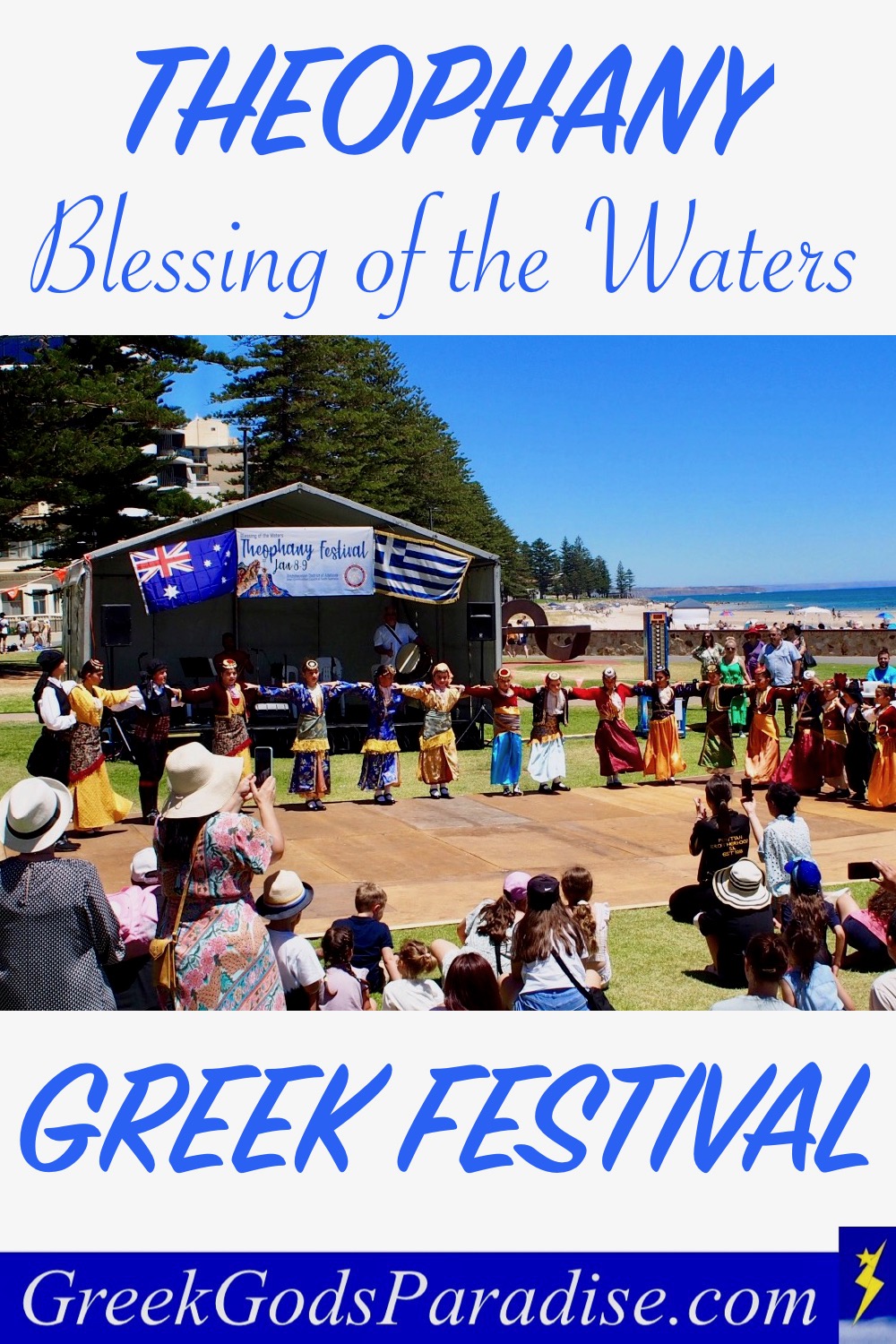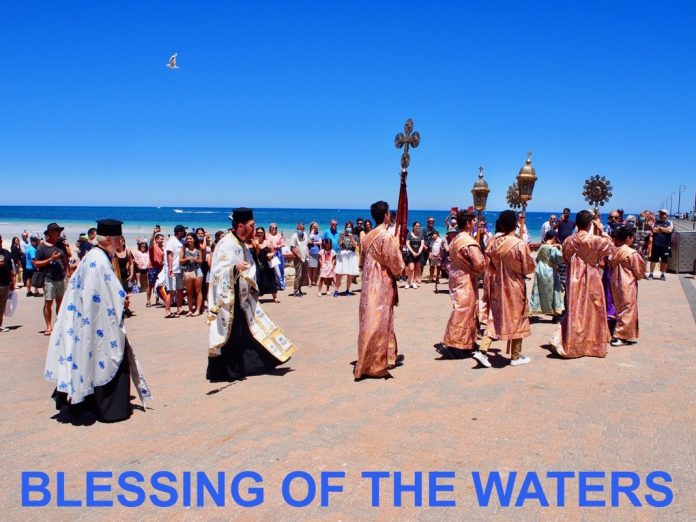The Blessing of the Waters is an annual Greek celebration held in Greece and many other countries around the world in early January. Think of it as one of the top Greek festivals!
Countries such as the United States, the UK, and Australia all celebrate the Blessing of the Waters.
I decided to go to the Blessing of the Waters for the first time in my life this year.
What you see here is my experience of this Greek celebration, and I have to say that it was fantastic!
Blessing of the waters
The Blessing of the Waters is also known as the Theophany Festival, the Feast of Epiphany, or something else along those lines.
It is a festival (feast) and a religious celebration combined.
If you’ve ever seen a priest throwing a wooden cross into the sea on TV, you already know something about this fun Greek celebration.
Younger Greeks, many of whom are between the ages of 15 to 25, then attempt to retrieve the cross by jumping into the sea and swimming for it.
But this is only one part of the Theophany festival. You also have Greek food and Greek dancing to enjoy.
It’s worth going to because it is an enjoyable spectacle to watch.
And don’t forget about the delicious Greek food you can eat.
Blessing of the Waters – Where to go?
The Blessing of the Waters is celebrated all over the Greek mainland.
In my opinion, going to the Blessing of the Waters in Athens would have to be one of the best day trips from Athens, even though I didn’t include it on that list.
That’s because the odds of you being in Athens at the right time are probably not going to be good unless you live there since the Epiphany occurs in early January, which is wintertime in Greece.
The Epiphany and the Blessing of the Waters also occur in the Greek Islands. Santorini, Mykonos, and probably every other Greek island have it.
Even if you don’t live in Greece, you still have an excellent chance that a Blessing of the Waters is taking place near you.
If many Greek people live in an area relatively close to the ocean, you can bet on it.
Multiple celebrations for the Theophany: Blessing of the Waters can even be a short drive away from one another within the same city.
So within 20 km (14 miles), you may be able to attend three or four different celebrations and ceremonies for the Blessing of the Waters.
That’s pretty good news because the Theophany Festival is great!
Theophany Festival – Blessing of the Waters
In Greece, the celebration may be called the Blessing of the sea or the Blessing of the seas.
Ton Foton (The shining forth) or The Festival of Lights are other names it goes by.
Epiphany, Theophany, whatever.
Going to the Theophany Festival in 2022 would be my first experience of the celebration.
I may have quickly walked past it by sheer coincidence before, but I planned to go to the Greek festival on purpose on this occasion.
The sign below advertising the Greek festival of the Blessing of the Waters made me think about going.
That’s because Greek food sprung into my mind immediately, and I felt like eating some.
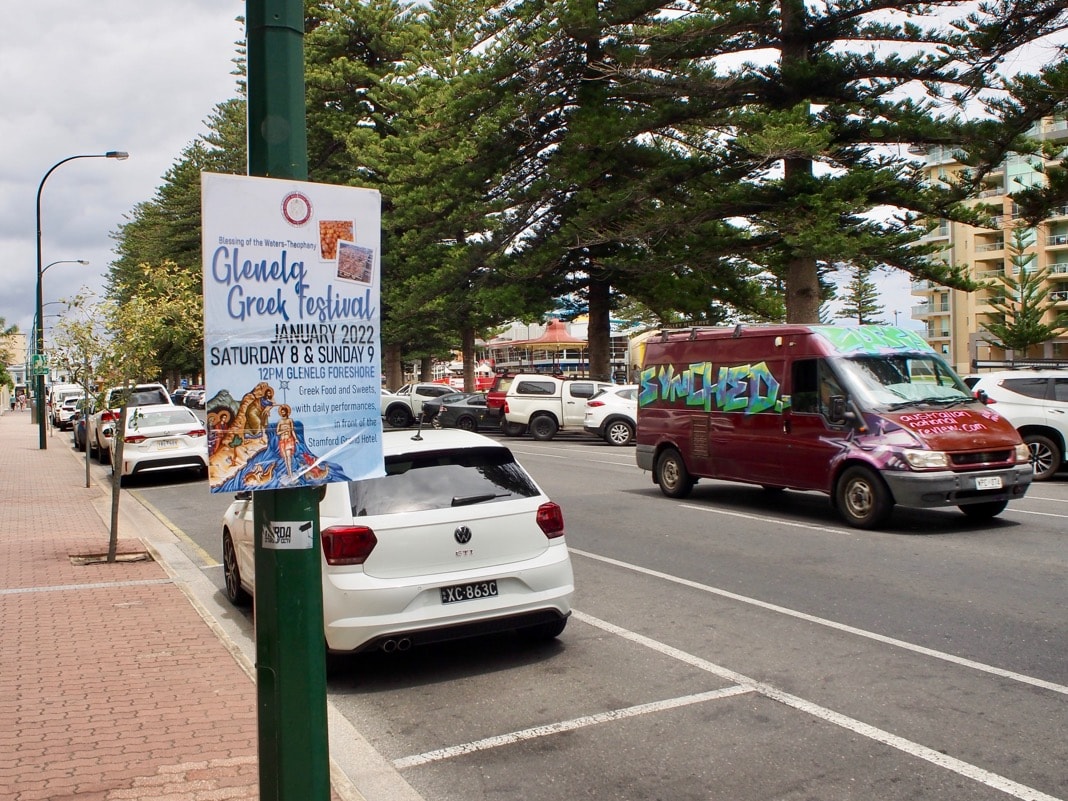
You may see Theophany, or Epiphany, associated with the Blessing of the Waters.
For instance, you can see Theophany in the sign above.
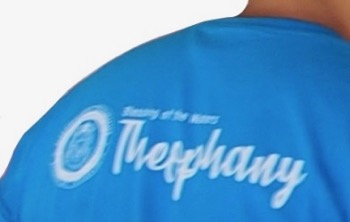
These words are just another way of describing the celebration.
Food staff serving people at the Greek festival I attended also wore t-shirts with “Theophany” written on them, both front and back.
“Theophany” meaning
I never knew this before, but “Theophany” means something like a vision of God.
Theophany: A visible manifestation to humankind of God or a god.
Greek food at the Blessing of the Waters
You will most likely be able to eat some barbecued Greek food like souvlaki and Greek yiros at the Theophany Festival. I’d expect this to be the case in every part of the world.
I bought myself three souvlaki and chips for $15, and it was delicious!
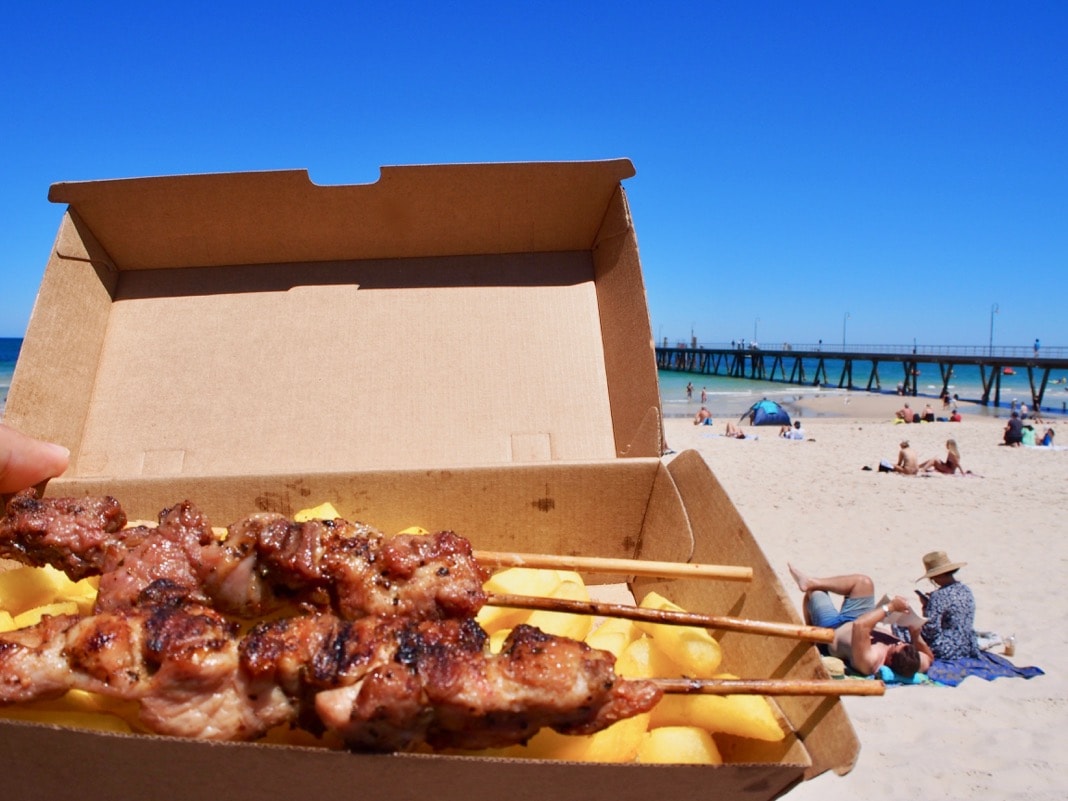
Sweets like loukoumades (small honey-covered round donuts) will be readily available at the Greek festival. You won’t want to miss eating a few of them.
The Theophany Festival at Glenelg went for a couple of days. On this occasion, I think it was the first time they held it over two days.
So I decided to go to the Blessing of the Waters on both days to check it out.
On the first day, I ended up staying at the festival for only a short time, maybe for about an hour, mainly because it was pretty dead.
Even so, I still got myself a Greek coffee to sip and a container full of loukoumades to snack on. Both were delicious!
When is the Epiphany celebrated in Greece?
Greece celebrates the Epiphany on the 6th of January.
Dates can vary for different locations and countries, but the Blessing of the Waters is still generally held quite close to the 6th of January.
I attended the Blessing of the Waters on Saturday and Sunday on the 8th and 9th of January.
More people can attend when holding the event on the weekend, so it seems like a good idea.
What happens during the Blessing of the Waters?
The only thing I knew about the Blessing of the Waters at the time was from what I had previously seen on TV. Something I had seen many times over the years.
A Priest would throw a wooden cross into the ocean. Eager volunteer swimmers would then quickly jump into the sea in the hope of being the first person to retrieve the cross.
Here is a video of the swimmers going for the cross that I took at the Blessing of the Waters.
It will show you the moment when the cross gets raised out of the water by someone. You can see it at the 15-second mark.
The reward for retrieving the Cross
The incredible thing about it is that the person retrieving the cross from the ocean gets blessed for an entire year. Sounds pretty awesome!
Whoever retrieves the wooden cross also gets a gold cross necklace as a bonus.
So it’s no wonder that a large number of people, often younger Greek guys, want to go for it.
I only found out about the gold cross necklace after talking to a guy fishing on Glenelg jetty one evening, ages ago.
We talked about a few fishing-related things, and then afterward, he revealed his gold cross necklace to me. He was wearing it, and he told me how he got it.
I was astonished because the guy wasn’t Greek. That’s when I found out that going for the cross was open to everyone. You didn’t have to be Greek. Up until that day, I had no idea.
Blessing of the Waters Glenelg (Adelaide)
Not long after I had finished eating my souvlaki meal (barbecued meat on sticks and chips), I waited for the priests to make their way to the sea.
I was only expecting to see one Priest, but I was wrong. Instead, there were a few of them.
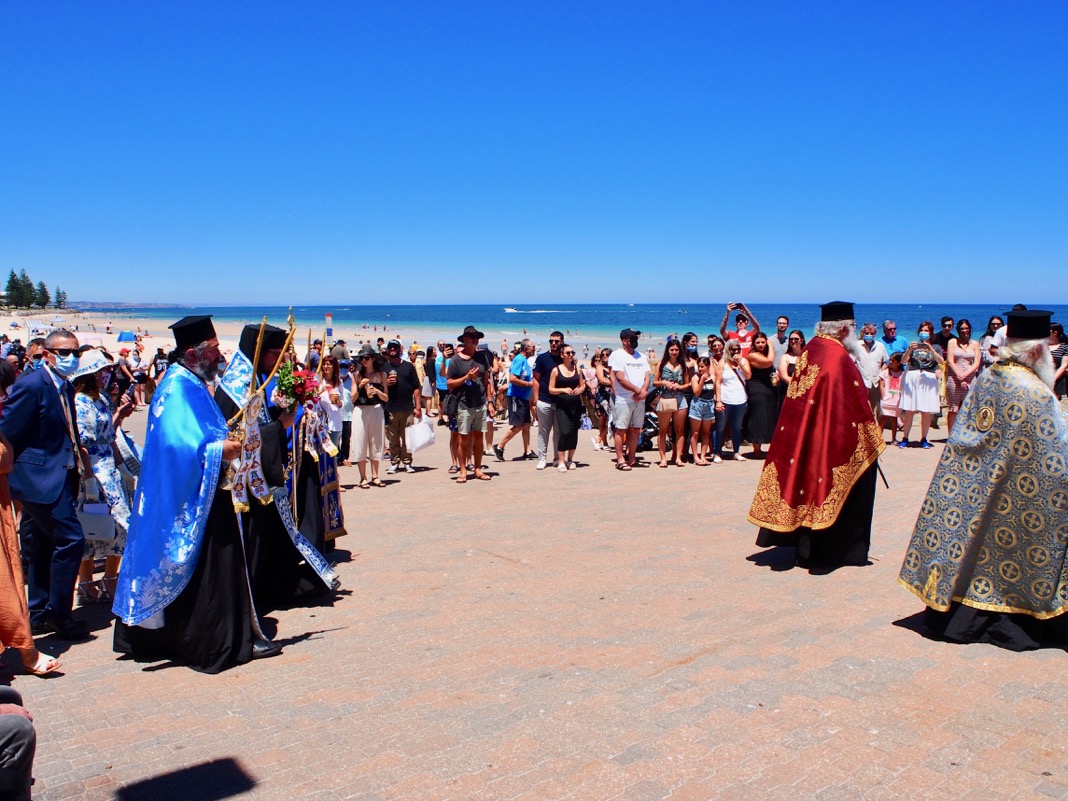
The Blessing of the Waters you see here happened in Adelaide. More precisely, at Glenelg, which is Adelaide’s premier beachside suburb.
So you know, the city of Adelaide in South Australia hosts a Blessing of the Waters in Glenelg. One at Henley Beach, Grange, and another Blessing of the Waters at Semaphore.
Following the priests onto Glenelg jetty are mostly Greek people who mainly watch the swimmers race towards the cross. One side of the jetty gets jam-packed with spectators.
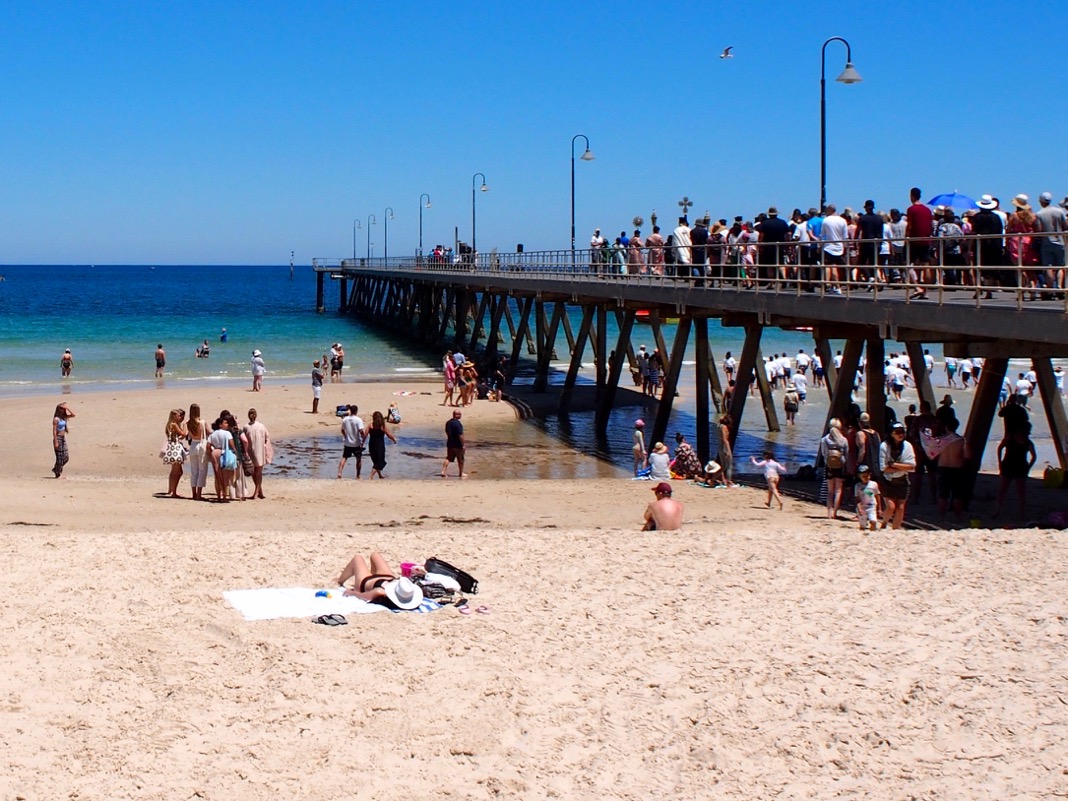
Blessing of the Waters Greek Orthodox Ceremony
Closer to the end of the jetty is where the Greek Orthodox religious ceremony takes place.
Here is the closest I got to the formal part of the Blessing of the Waters ceremony.
I was probably about 10 meters away from the priests when I stood at this spot. I could hear some religious chanting, but it was all Greek to me, like they say.
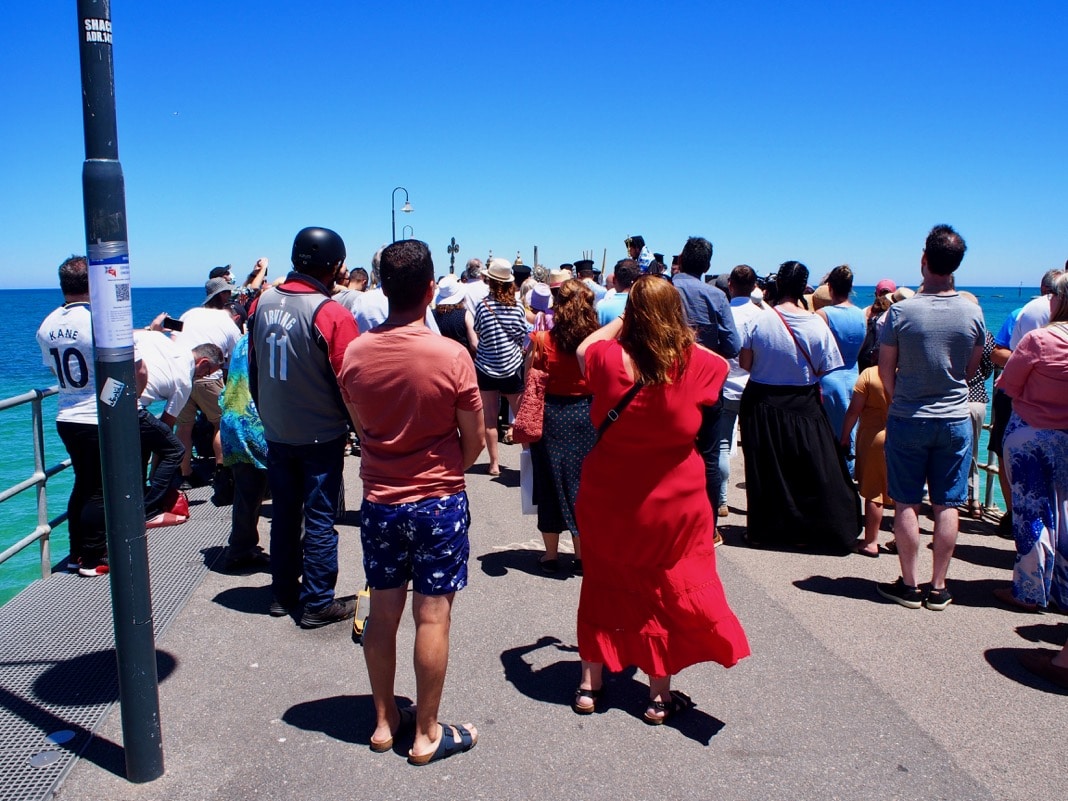
As part of the Blessing of the Sea ceremony, they release a white dove or two (not sure on the number), allowing the bird/s to fly away to freedom, but I missed it.
Blessing of the Waters – Swimming for the cross
Swimmers eagerly wait for the wooden cross to be thrown into the water by one of the Priests.
The swimmers wait on the sand at the beach, ready to go for the cross.
Years ago, they used to jump off the jetty into the water to retrieve the cross.
Nowadays, it’s more of a half-run, half-swim contest to get to the cross first. But, of course, it also depends on how high the tide is.
The swimmers going for the cross wore a similar white t-shirt at the Blessing of the Waters.
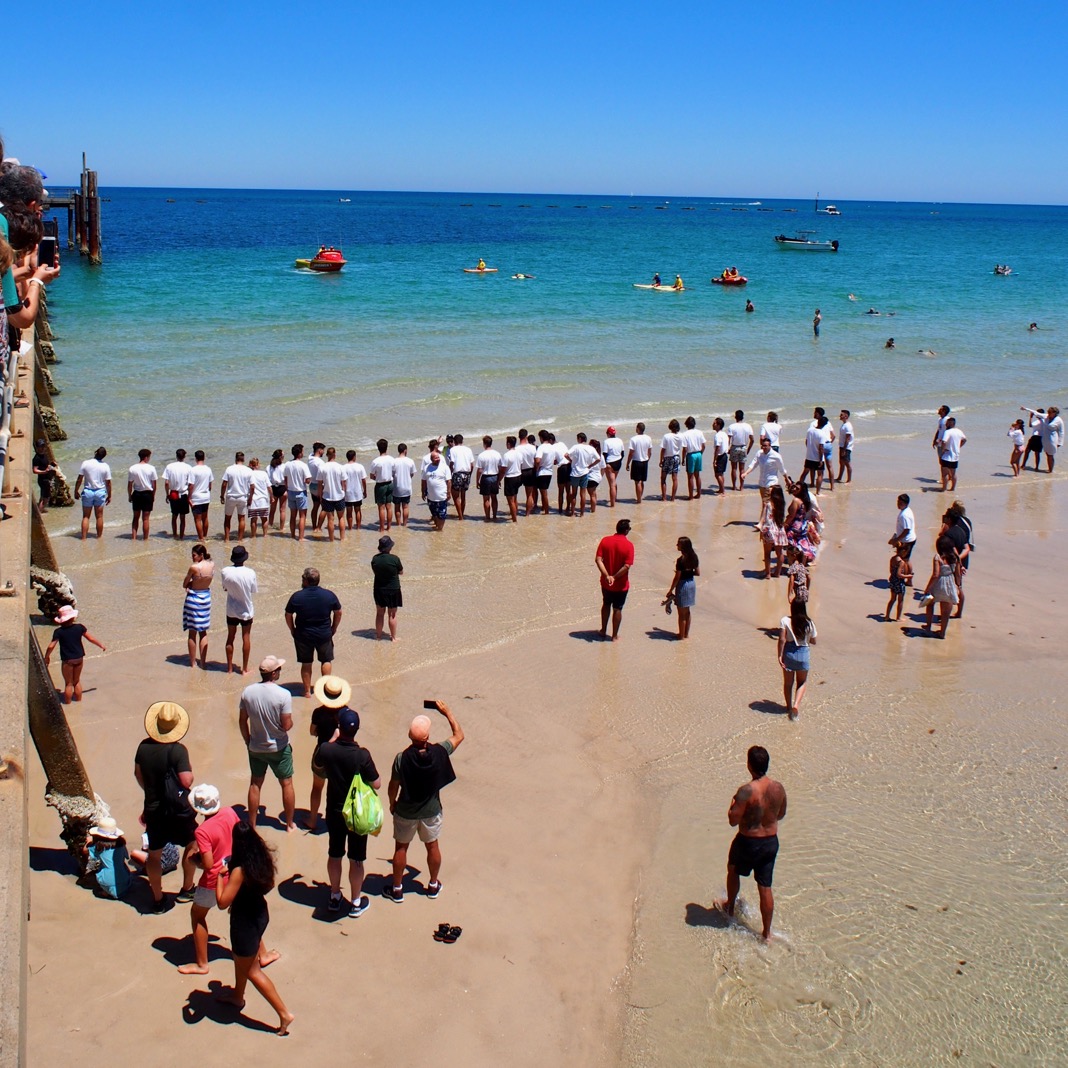
I wouldn’t have thought this to be common at other Blessing of the Waters in Greece or other places worldwide.
It probably started in Glenelg due to a bizarre incident at the Blessing of the Waters at Glenelg beach in 2021.
That year a guy came from the side of Glenelg jetty out of nowhere and stole the cross.
You can watch it on a news video on Youtube: Man hijacks religious ceremony at Blessing of the Waters
He wasn’t registered to participate in the event, even though everyone had to be.
The crazy thing about it was that he wouldn’t give the cross back unless he received a gold cross necklace from the Greek Orthodox Church.
Here, you can see the swimmers who went for the cross from a picture I had taken while underneath the jetty.
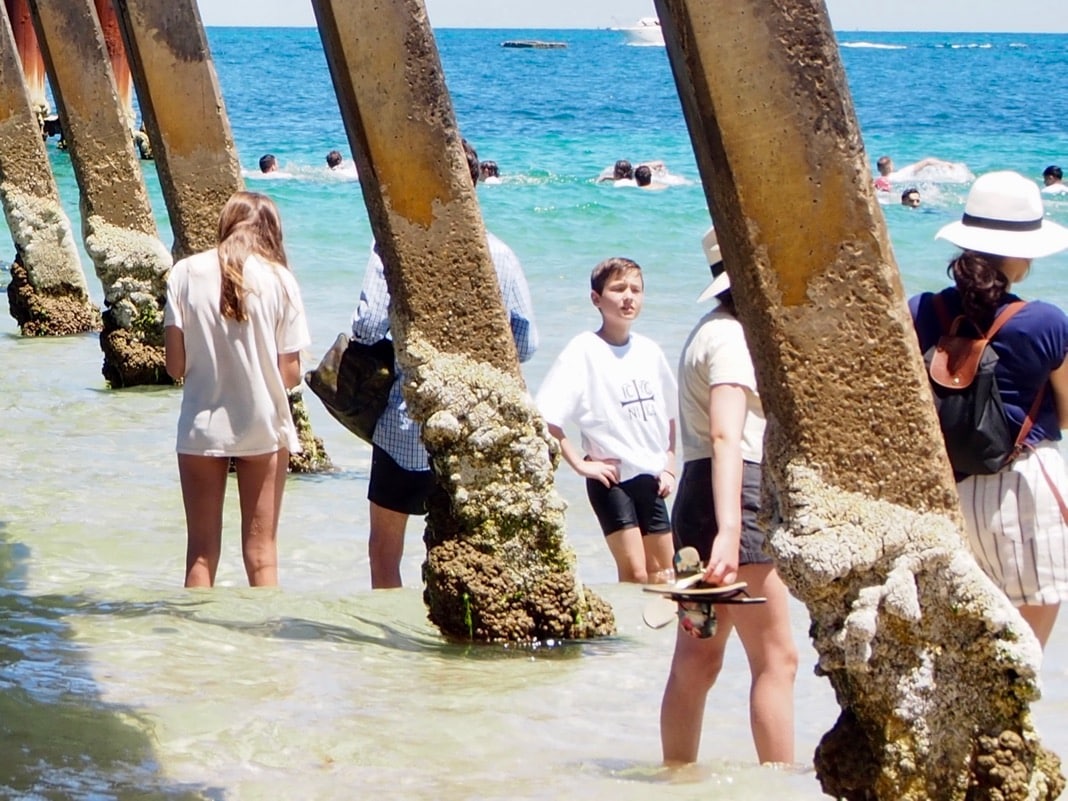
I couldn’t see who retrieved the cross at the time. But the video situated higher up shows the moment if you zoom in on it and take a close look.
Later on, I found out that it was a young Greek guy, someone who was studying dentistry at University.
I would have preferred watching the race to the cross on top of the jetty.
But you have to get a good spot on the jetty as fast as you can. But, unfortunately, I didn’t do that, so I went underneath.
Theophany Greek Festival – Greek Dancing
Later on, I knew that some Greek dancers would entertain the crowd. Here are some of the younger Greek dancers. These were the first dancers I saw performing at the festival.
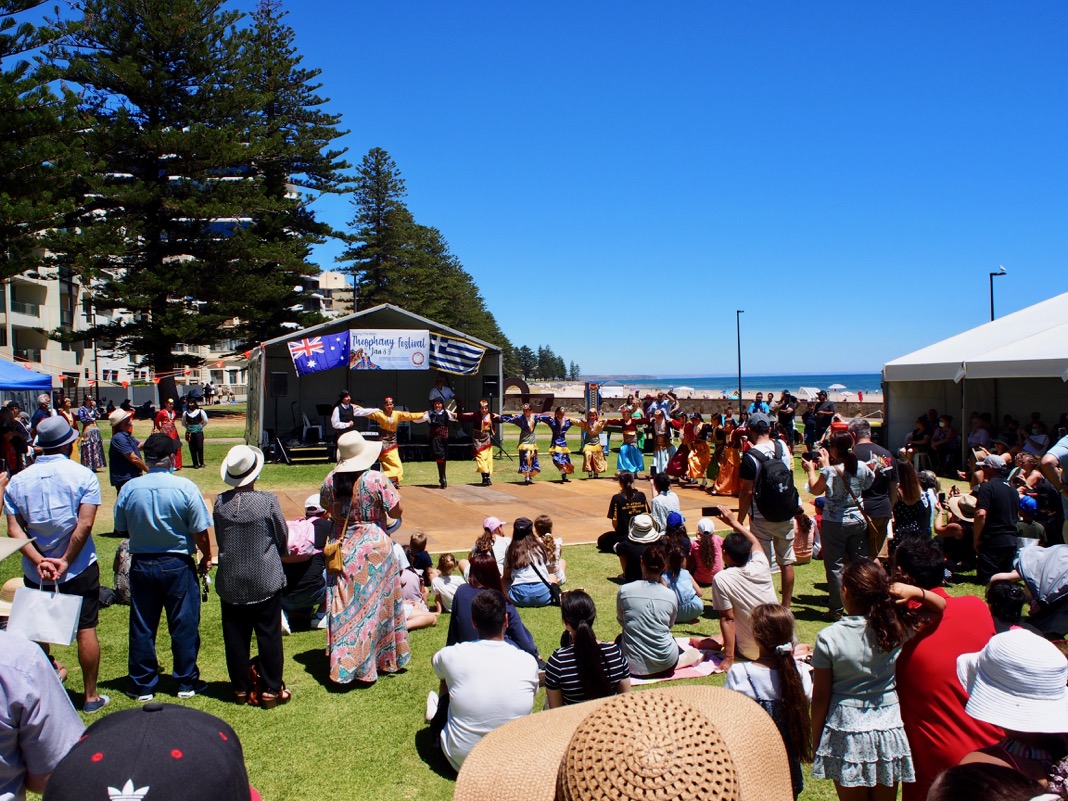
Pontic Greeks at the Theophany Festival
I later found out that Pontian Greeks were the only ones brave enough to turn up to do some traditional Greek dancing at the Blessing of the Waters in Glenelg.
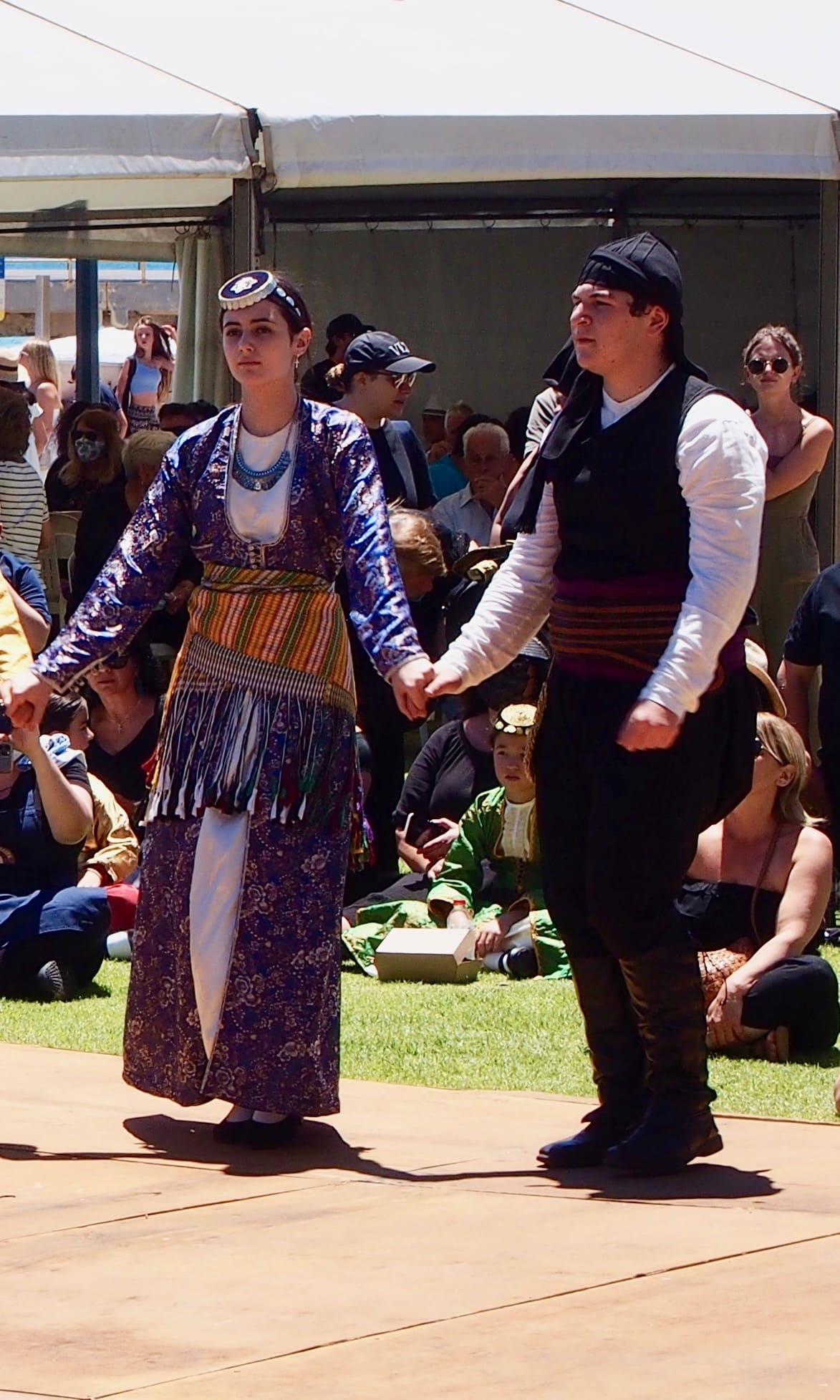
Luckily, these Pontian Greek dancers showed up because the Blessing of the Waters wouldn’t have been the same without them.
Other Greek dancers had pulled out because of Covid virus fears.
You can’t blame them for that, but everyone who goes to a Greek festival wants to see some Greek dancing.
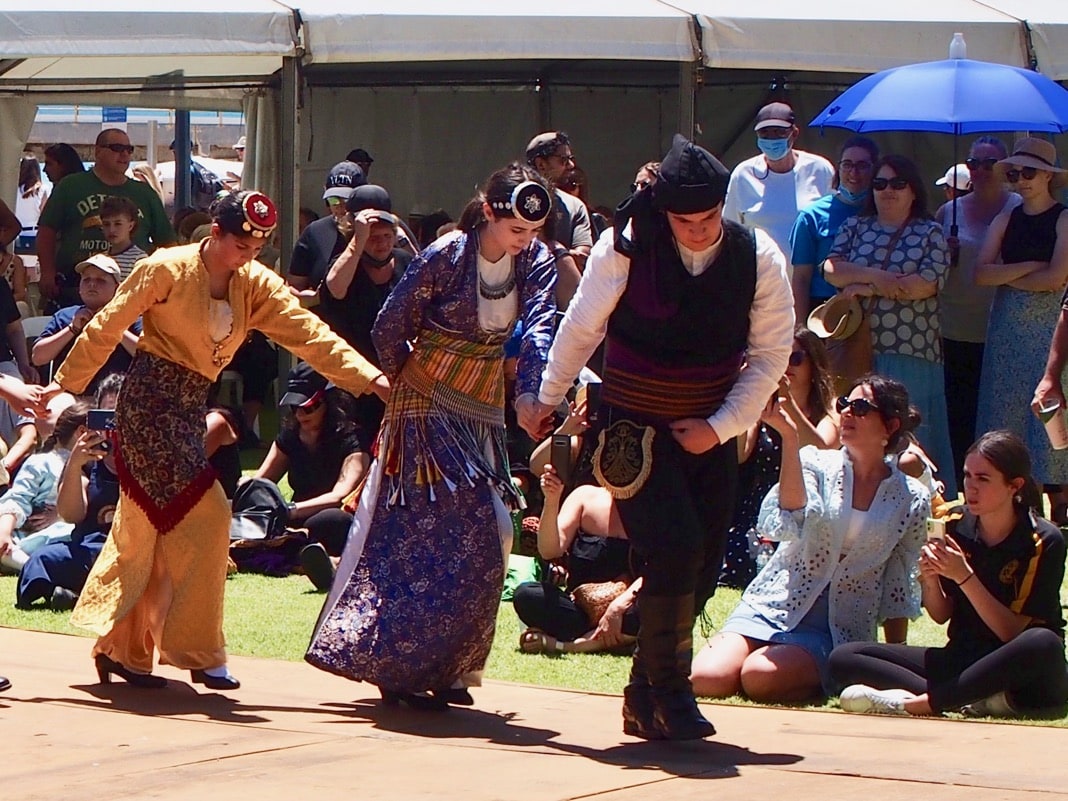
I don’t think I have ever seen Pontic Greeks dance before. Nor have I ever noticed their unusual costume designs before that day, so it was great to see.
I also took a short video of them dancing. Here it is:
Greek Lineage
In the pic below, you can see the Pontic Greek dancers leaving the stage.
When the Pontian Greek dancers departed from the stage, that’s about the time when I left as well.
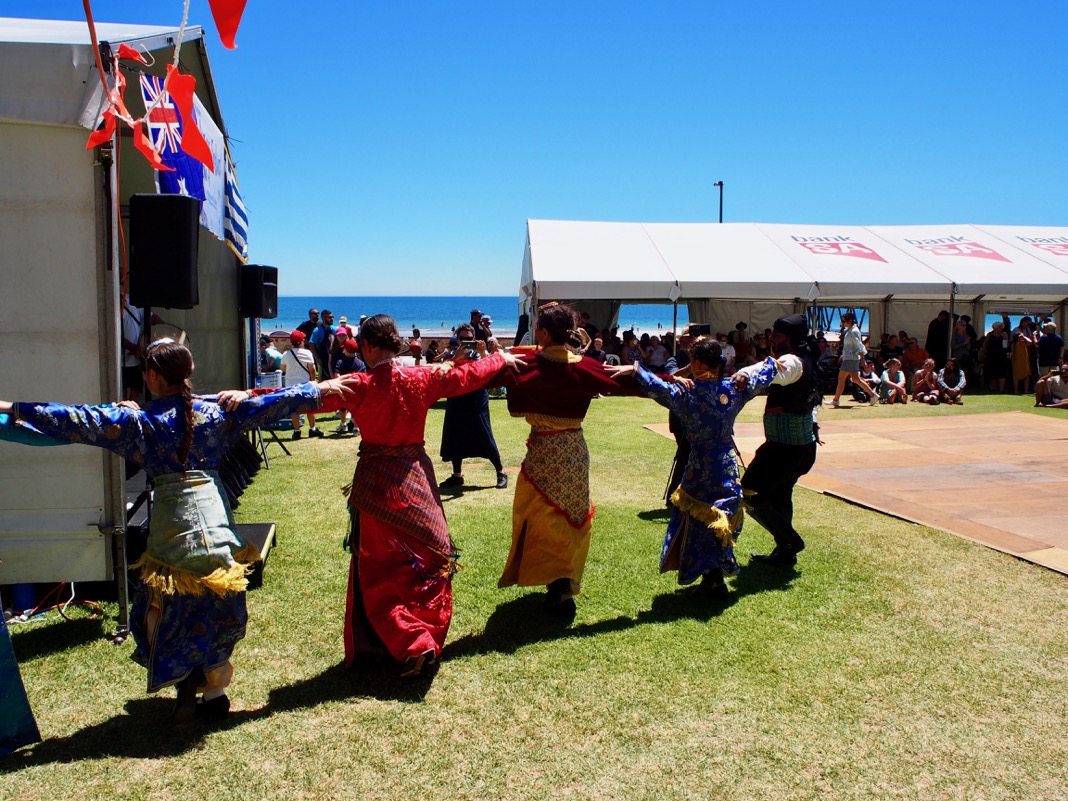
All up, I have to say that I enjoyed myself at the Theophany festival.
Greeks at the Theophany Festival
I never expected to see Kosta from Uni days at the Blessing of the Waters.
We bumped into each other first at the giant Glenelg Ferris Wheel that went up in summer, situated only a few meters away from the jetty.
He was there with his wife and three kids. We talked to each other for a little while but moved on relatively quickly.
Later on, about 1-2 hours later, we bumped into each other again at a spot where I had taken the above photo with my Olympus camera.
While we were there, Kosta blurted out that he had done a DNA test to find his ancestry.
That got my attention. I won’t go into exact percentages and every part of Kosta’s Hellenic ancestry, but he has Macedonian genealogy, including ancestry from the Aegean Islands!
Incredibly, a bit later, Nick showed up at the same spot where Kosta and I were.
He’s another guy I knew from University days. We both studied electrical engineering, whereas Kosta studied computing.
Afterward, I started wondering, could Kosta have descended from a Greek God?
Should you go to the Blessing of the Waters if you’re not Greek?
Yes, yes, yes! Go and enjoy yourself even if you only go for Greek food.
Going for the souvlaki alone is an excellent reason to go to this fantastic Greek festival.
You don’t need to be Greek to enjoy the Theophany Festival and the Blessing of the Waters.
Blessing of the Water Tips
The best time to go to the Blessing of the Waters – the Theophany Festival – is when the Priest throws the cross into the water.
That’s probably the second day of the festival if the celebration goes over two days.
My top recommendation is to find out the time when the Priest will throw the cross into the water.
You will want to arrive about an hour earlier. Then stay for two or three hours to have something to eat, and watch a bit of Greek dancing.
Remember, if you want to swim for the cross, you will most likely have to register beforehand if you wish to take part in it.
Don’t go to the beach thinking that you can swim for the cross and claim a gold cross necklace if you grab the wooden cross first because you can’t.
Poseidon, God of the sea
From ancient times to today, the mystery of the Blessing of the Waters has significantly altered.
In Greek mythology, the power over the seas once belonged to Poseidon, God of the sea.
So it was Poseidon who blessed the sea.
Nowadays, the Greek God Poseidon (Roman: Neptune) is almost a forgotten Greek God.
However, solid reminders of Poseidon in the form of Poseidon (Neptune) fountains still exist.
In Greek mythology, Aeolus, the keeper of the winds, also had power over the seas since he could quickly whip up a storm.
The Greek hero Odysseus would learn about it the hard way.
Here are 33 movies based on The Odyssey to make you wonder about the ocean.
Who do you think blesses the waters?
Pin it … Share it
